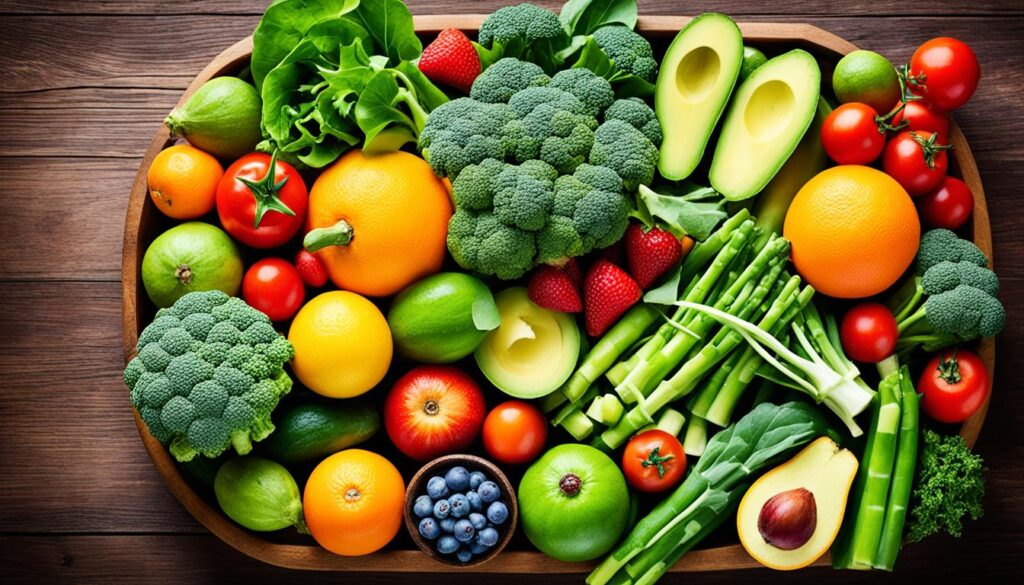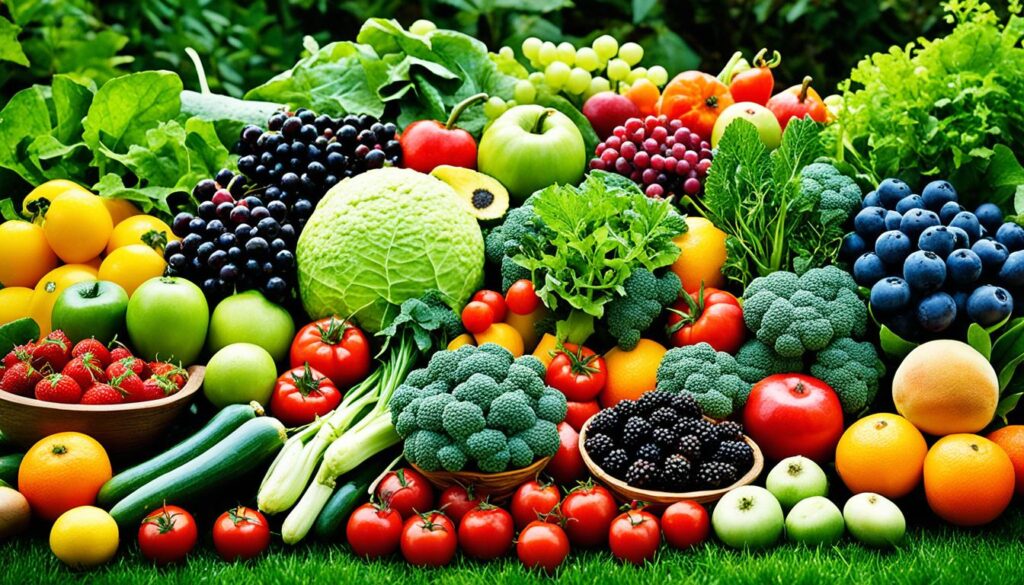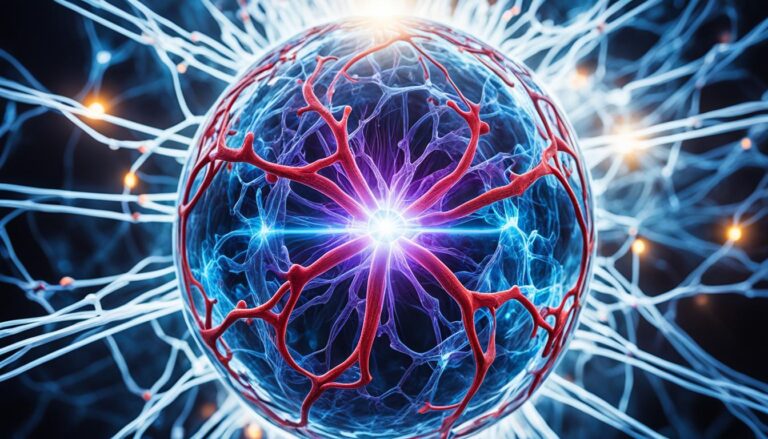Understanding How Precursors to Glutathione Work
Glutathione is a molecule so vital that low levels can lead to serious health issues. These include heart disease and dementia. Known as the body’s ‘master antioxidant,’ it’s abundant in our liver. Its production relies on certain precursors available in the body.
Although our bodies make these precursors, we can increase their levels. We do this by eating foods and taking supplements rich in natural glutathione boosters.
The importance of cysteine, glutamate, and glycine in making glutathione is well-documented. These amino acids are essential. They help create one of the most important detoxifiers in our cells. This molecule, discovered over a hundred years ago, is still being studied today.
Learning about natural glutathione boosters can lead to new health solutions. It highlights the need for a diet full of GSH precursors. These nutrients help fight oxidative stress, protecting our health silently.
The Biological Importance of Glutathione in Cellular Health
In the world of human cells, glutathione acts as a strong guard. It fights the constant threat of oxidative stress. Having enough of this super-antioxidant in cells is crucial. It counteracts the harm caused by free radicals and keeps cells strong. Knowing how to boost glutathione levels means making our natural defenses stronger.
The Role of Glutathione in Oxidative Stress Management
The cell’s world is full of dangers like reactive oxygen species (ROS). These can upset the balance our health needs. GSH brings back this balance by fighting off these threats. Yet, its success depends on our body’s ability to increase glutathione production when faced with more challenges. This fight on a tiny scale helps keep our cells healthy and intact.
Glutathione’s Protective Mechanisms Against Cellular Damage
Think of a cell like a city protected by walls. Glutathione’s defense is like the city’s defenses against invaders. It’s a powerful glutathione building block, fighting off cell damage. If we lose it, it’s like the city walls being broken down. This leaves the cells open to attack, threatening their very foundation.
Impact of Glutathione on Aging and Degenerative Diseases
As time goes by, keeping cells healthy gets harder. Aging tends to lower glutathione levels. This makes it easier for diseases like Alzheimer’s to take hold. These conditions show why we must have enough GSH. It fights off harmful substances that attack brain connections. So, it’s critical to boost glutathione levels. This helps protect our brains from aging and diseases.
Precursors to Glutathione: An Overview
The synthesis of glutathione is key for cell health. It needs amino acids: cysteine, glutamate, and glycine. Eating foods that enhance glutathione levels can naturally support this process. These foods, when part of a healthy diet, boost the body’s antioxidant defenses.
Supplements for glutathione synthesis are also key. They provide the precursors in forms the body can use well. Such supplements help the body make more glutathione. This is important when the diet lacks or metabolism is slow. People seeking ways to raise glutathione levels find these supplements useful.
Choosing the right foods and supplements can boost glutathione levels. Eating foods like garlic, onions, and cruciferous veggies helps, due to their sulfur content. Whey protein is also good for glutathione. Adding supplements like N-acetylcysteine (NAC) or S-adenosylmethionine (SAMe) can further help. These steps offer a complete way to increase antioxidants.
So, by eating foods that enhance glutathione and taking supplements for glutathione synthesis, you’re on the right track in adding precursors to glutathione. Also, living a lifestyle that supports detox and health is good. This full approach helps build a strong antioxidant system. It fights oxidative stress and helps cells last longer.
The Synthesis of Glutathione Using Its Amino Acid Building Blocks
Glutathione plays a critical role in our body’s defense. It is made through a process that relies on the amino acids cysteine, glutamate, and glycine. These building blocks are key to making glutathione which helps in fighting off damage from toxins and supports our immune system. It’s vital to keep these amino acids at the right levels for good health.
The Essential Contributions of Cysteine, Glutamate, and Glycine
The amino acids cysteine, glutamate, and glycine are crucial for making glutathione. Cysteine brings in a sulfur part that’s needed for the antioxidant action of glutathione. Glycine completes the molecule, making it stable inside cells. Glutamate helps in forming the structure that lets glutathione work well.
Regulating the Availability of Glutathione’s Precursor Amino Acids
Keeping the right levels of these amino acids is key for making precursors to glutathione. This balance shows how well our body can respond to stress from toxins. The system that manages this is complex but essential for healthy cells. What we eat and how we live can influence how much glutathione our body makes.

Glu-Cys-Gly Tripeptide: The Glutathione Foundation
To boost cell health, we need to increase glutathione production. This depends on having Glu-Cys-Gly, a key tripeptide. Glutamate, cysteine, and glycine come together in a special way to create glutathione building blocks. Cysteine is crucial because it donates an electron, thanks to its thiol group. This makes glutathione a powerful antioxidant.
Getting rid of free radicals and detoxifying depends on having enough of these amino acids. It’s vital to find the best glutathione precursors to eat or take as supplements. Eating foods rich in cysteine like whey protein and sulfur-full veggies, plus foods with glutamate and glycine is key. This helps keep the antioxidant system balanced.
Our cells need more GSH when we’re active or stressed. It’s crucial to find natural ways to increase glutathione production. This helps us fight oxidative stress, live longer, and be healthier. The Glu-Cys-Gly tripeptide doesn’t just support glutathione. It shows the beauty and complexity of life’s biochemical processes.
Factors Influencing Glutathione Levels in the Body
Knowing how to keep glutathione levels balanced is key for health. Figuring out the role of lifestyle and body factors helps pinpoint ways to raise glutathione naturally.

Age-Related Declines in Natural Glutathione Production
As we get older, our GSH production naturally drops. This powerful antioxidant helps protect our cells and detox. A lower glutathione production means we face more oxidative stress and age-related health issues so adding precursors to glutathione is very important.
Impact of Diet and Nutrition on Glutathione Synthesis
What we eat can boost glutathione levels. Certain foods give our body the building blocks it needs to make this antioxidant. Eating these foods fights off oxidative stress. It also lets us raise our glutathione levels by making smart food choices.
The Relationship Between Glutathione and Neurodegenerative Diseases
Recent studies have focused on how GSH, an important antioxidant, interacts with neurodegenerative diseases. They hint that using the best glutathione precursors to keep glutathione levels up could be good for brain health. In particular, glutathione might help prevent diseases like Alzheimer’s, which lead to loss of brain function.
Glutathione Deficiency and its Links to Alzheimer’s Disease
Alzheimer’s disease shows up through specific protein build-ups and lower glutathione levels, weakening the brain’s defense against oxidation. A lack of glutathione seems connected to how Alzheimer’s disease progresses. Exploring how to increase glutathione production is becoming a key focus for new treatments. When glutathione is low, oxidative damage gets worse, speeding up brain damage.
The Potential of Glutathione in Preventing Cognitive Decline
Some believe that higher GSH levels could protect against the worsening of brain functions in neurodegenerative diseases. Research is underway to see if boosting glutathione through diet, changes in lifestyle, or supplements can protect the brain by reducing oxidative stress and improving nerve cell connections. This highlights why it’s crucial to get the best glutathione precursors through diet or supplements to help prevent these diseases.
γ-Glutamylcysteine (GGC): A Direct Precursor to Glutathione
Boosting overall health can be promising with supplements for glutathione synthesis. γ-Glutamylcysteine (GGC) is especially promising. It helps increase GSH production, which is crucial for our brains.
GGC offers a new approach compared to traditional methods. It provides a direct boost, making the process simpler. This is vital during high oxidative stress.
Exploring the Effectiveness of GGC Supplementation
Recent research highlights GGC’s potential as a top best glutathione precursor. It directly supplies what’s needed for making glutathione. This could boost antioxidant defenses for people with low levels.
GGC’s Role in Bypassing Biochemical Regulation of Glutathione Synthesis
GGC’s bioavailability overcomes glutathione synthesis limits. By taking GGC, people might fill up their glutathione more effectively. This is crucial for fighting diseases like Alzheimer’s, where oxidative stress is a key factor.
Foods That Enhance Glutathione Levels and Their Precursors
Eating certain foods can really help boost your body’s glutathione, an important antioxidant. These foods have special amino acids. They help your body make more GSH. Foods like chicken, turkey, yogurt, cheese, eggs, and sunflower seeds are very good for this. They have a lot of cysteine, which is key for making glutathione. Whey protein is also a great choice because it’s high in cysteine.
Foods that are rich in glutamate and glycine also help make more glutathione. For glutamate, eat more tomatoes, broccoli, and spinach. Glycine comes from eating protein-rich foods like fish, meat, and soy products. Eating these foods that enhance glutathione supports your health. It helps prevent diseases by fighting oxidative damage and chronic health issues.
Adding these foods to your diet is a smart, natural way to boost glutathione production. A varied diet including these foods is key to keeping your glutathione levels high. This helps keep you healthy.
Supplements for Glutathione Synthesis: What to Consider
When looking into supplements for glutathione synthesis, it’s key to know about the precursors needed. The best options are those that our bodies can use well for making GSH. The forms of these precursors, like amino acids or molecules like γ-Glutamylcysteine, affect how well they work.
Research is vital to find out which approaches work best. Some supplements might say they boost glutathione levels. But their ingredients may not get into the cells or might break down too soon. So, choosing supplements backed by solid science is smart. It helps pick the most effective ones and find ways to raise GSH levels.
Utilizing a natural supplements based glutathione precursor protocol like our Viprox Therapy can greatly enhance your over all health. The Viprox Protocol consists of Viprox and Viprox Junior packages. The packages contain GSH Complex for restoring, strengthening and balancing your immune system. Une Vie for enhanced hydration and Triozyme enzymes that support improved digestion.
It’s critical to think about how these supplements work with our body’s own glutathione making. We want to help, not harm, this natural process. A mix of eating foods high in GSH precursors and wise supplement use is best. This way, we can keep our glutathione levels up and our cells protected.
- Glutathione for Hangovers: Your Recovery Solution - July 2, 2024
- Top Glutathione Foods High in Antioxidant Power - June 30, 2024
- Boost Your Health with Top Foods for Glutathione - June 21, 2024







